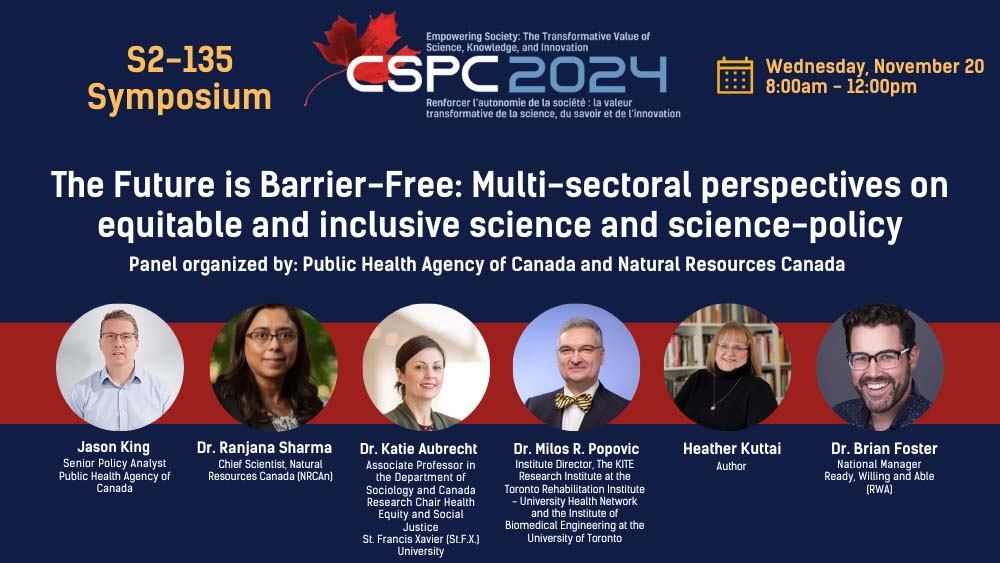Symposium: S2-135
The Future is Barrier-Free: Multi-sectoral perspectives on equitable and inclusive science and science-policy
Abstract:
As organizations in Canada operationalize legislative requirements to remove barriers to inclusion for Persons with Disabilities (PwD), this timely panel provides best-practices and lived-experiences to engage in a horizontal policy discussion exploring:
- The place of disability in scientific and social innovation
- How science, research, and innovation can empower PwD
- Measures to create barrier-free and targeted research and employment opportunities
- Barriers that remain and ways to overcome them
- The importance of inclusion in advancing Canada’s science, research, and innovation objectives
- A must-attend session for policy and decision-makers
Summary of Conversations
The panel explored creating an equitable and inclusive science and science policy landscape. Discussions highlighted the need for a cultural definition of disability beyond medical models, emphasizing its sociopolitical identity. Federal initiatives, like retrofitting labs and interdepartmental workshops, were shared alongside the importance of data collection that includes differently-abled staff. Panelists underscored the benefits of inclusive workplaces, citing increased employee engagement and innovation. Personal stories illustrated past and present challenges in accessing science education and careers. Adapting technology for disabled individuals can provide accessibility to the population as a whole. The conversation emphasized a shift from reactive to proactive measures in removing barriers and valuing diversity.
Take Away Messages/ Current Status of Challenges
The panel shared the following challenges and important messages:
- The need for cultural shift: A significant move is needed from medicalized understandings of disability towards recognizing it as a socio-political identity.
- Accessibility legislation gaps: Current legislation often focuses on organizational culture but lacks a comprehensive definition of disability that reflects cultural nuances.
- Incomplete accessibility in science facilities: Federal science facilities are often inaccessible, pointing to the need for retrofitting and inclusive design.
- Data gaps: Differently-abled staff are not always included in data collection, hindering effective policy and resource allocation.
- Workplace culture: Stigma and lack of open conversation around disability topics persist in workplaces.
- Funding disparities: Researchers with disabilities face disproportionately lower chances of success in research grant applications.
- STEM representation: Lower representation of individuals with disabilities in STEM streams needs to be addressed.
- Poverty link: People with disabilities are twice as likely to live in poverty in Canada, highlighting systemic inequities.
Recommendations/Next Steps
The panel proposed the following recommendations:
- Redefine disability: Develop a cultural definition of disability to inform policy and promote inclusivity beyond medical models.
- Expand accessibility plans: Develop accessibility plans that include employees, researchers, and the public, moving beyond reactive responses to proactive barrier removal.
- Prioritize inclusive lab design: Retrofit labs to meet the needs of differently-abled scientists and staff, ensuring accessibility in built environments.
- Promote interdepartmental collaboration: Encourage knowledge sharing across federal departments through workshops and communities of practice.
- Engage HR in accessibility: Involve HR in understanding and addressing funding needs for accessibility initiatives.
- Support community organizations: Partner with community or disability employment organizations to leverage their expertise and access diverse talent pools.
- Develop employer training: Implement ongoing training on disability for employers and managers to foster inclusive workplaces.
- Incorporate universal design principles: Apply universal design principles in research spaces, equipment, and practices to benefit all individuals.
* This summary has been generated with the assistance of AI tools


